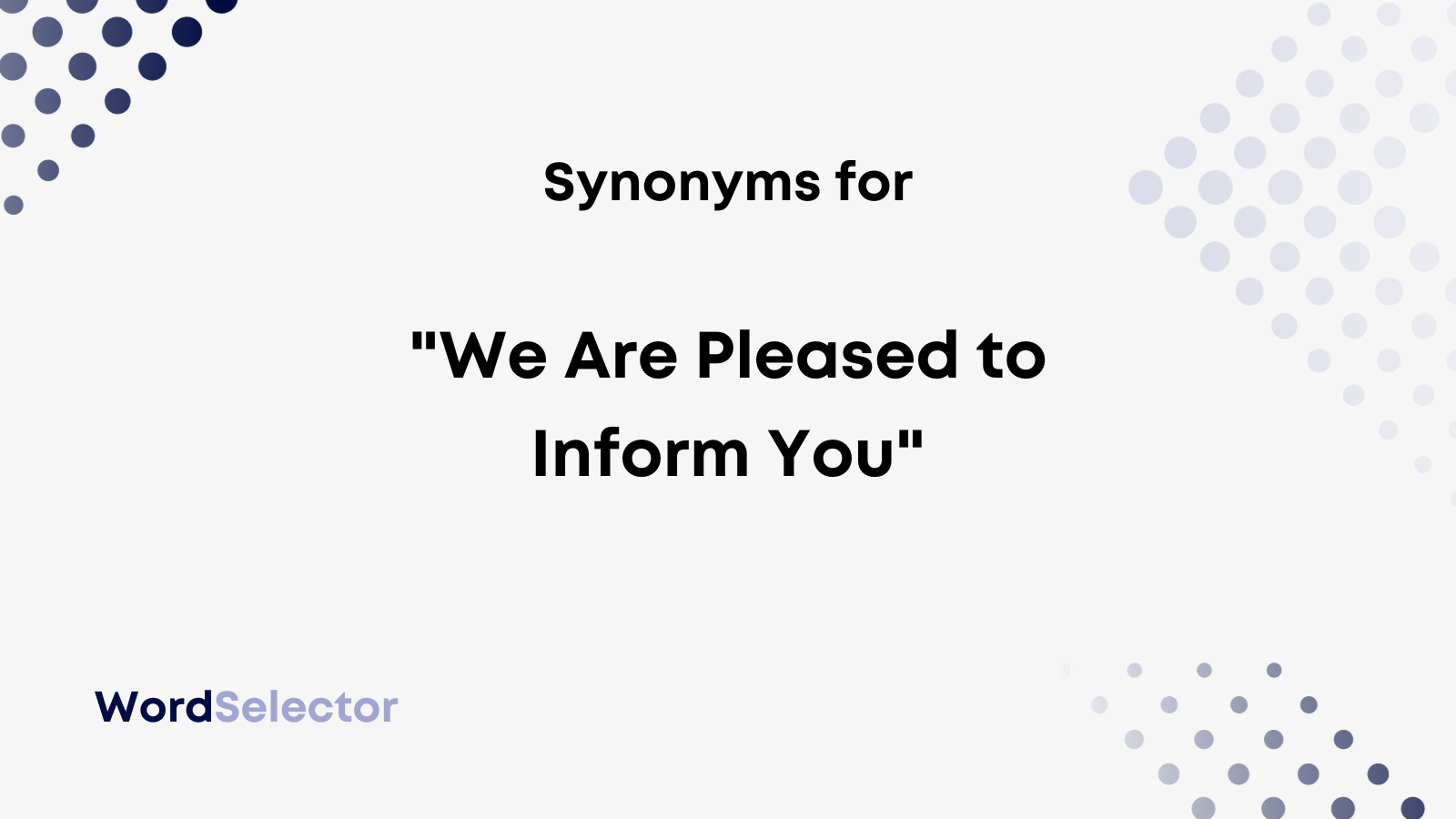Are you trying to share some good news with a recipient and want to sound enthusiastic?
Perhaps you’re trying to say “we are pleased to inform you.”
But you’re worried that it’s a bit repetitive or overused, right?
This article has gathered some alternatives showing you how to say “we are pleased to inform you” in an email.
Other Ways to Say “We Are Pleased to Inform You”
- We are delighted to notify you
- I’m happy to let you know
- We’re glad to inform you
- We are thrilled to tell you
- We are pleased to update you
- We’re ready to share with you
- I’m ecstatic that I get to share this with you
- We are so excited to announce
- We’re so grateful to say
- We’re happy to say
- We are so pleased to let you know
KEY TAKEAWAYS
- “We are pleased to inform you” is a positive and polite phrase to include in formal emails.
- Try “we are delighted to notify you” as a formal alternative that’ll help you keep things positive and respectful.
- “I’m happy to let you know” works really well as a more informal and friendly synonym.
Keep reading to learn how to say “we are pleased to inform you” professionally and conversationally. We’ve covered the best formal and informal phrases to assist you.
Alternatively, you can skip to the final section. We’ve explained whether it’s correct to use “we are pleased to inform you” in the first place, so you can understand more about it.
We Are Delighted to Notify You (Formal)
Another way to say “we are pleased to inform you” is “we are delighted to notify you.” It’s a great formal synonym that helps to keep things interesting in your emails.
We recommend using it because it’s a bit more impactful than the original phrase.
For starters, switching “pleased” with “delighted” shows you’re genuinely enthusiastic about the news.
We recommend using it when emailing a successful applicant.
Starting an email with a positive phrase like “we are delighted to notify you” helps the applicant to come to terms with the positive news quicker!
It’s a great way to set things up, and you’re bound to put a smile on the applicant’s face when they learn they got the job they applied for.
Here’s a great sample email to show you how it works if you’re still unsure:
Dear Duncan,
We are delighted to notify you that you got the position! We look forward to you starting with us on Monday.
All the best,
Sarah Catford
I’m Happy to Let You Know (Informal)
You can also opt for a more informal synonym with “I’m happy to let you know.” It’s great to include when emailing coworkers you get along with.
Generally, this phrase works when a coworker comes to you with an idea. If you have good news to share with them regarding their idea, this is a great way to show it.
It’s friendly and polite. And, generally, it’ll ensure the recipient is in a good mood when they read through your email and see what positive news you have to share.
You can also refer to this email sample:
Dear Alfie,
I’m happy to let you know that they considered your idea and agreed! So, you can expect to hear from them very shortly!
Best regards,
Thomas Woodshack
Is It Correct to Say “We Are Pleased to Inform You”?
It is correct to say “we are pleased to inform you.” It also happens to be one of the most popular formal phrases to use when sharing good news.
However, if you don’t believe us, check out the following email sample:
Dear Mr. Cricket,
We are pleased to inform you that you have been selected, and we cannot wait to see you working alongside us.
Yours,
Damian Walmart
As you can see, it’s a polite and respectful way to introduce someone to positive news. We highly recommend it if you’re looking to brighten the day of the recipient.
You can also use this variation:
- I am pleased to inform you
Changing “we” to “I” makes things more personal and direct. It’s a good way to personally give someone good news to add a bit more of a friendly touch to it.
Also, we recommend exploring these extensions:
- We are pleased to inform you that you have been selected for the position
- We are pleased to inform you that you are the candidates who best
- We are pleased to inform you that our company
- We are pleased to inform you that your application
- We are pleased to inform you that we have received
As you can see, each of these extensions is a bit more specific. They help you to explain exactly what you’re “pleased” to inform someone about.

